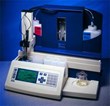Entry-level pKa and LogP measurement

High-quality pKa and logP measurements no longer belong only to major pharmaceutical companies alone. The semi-automated PCA200 pKa/LogP analyzer from Sirius Analytica Instruments (East Sussex, UK) now offers smaller laboratories and universities the advantages of accurate pKa and LogP measurements for a reasonable price.

PCA200 was developed specifically for laboratories with smaller workloads. It uses the industry-standard pH-metric technique pioneered in Sirius's PCA101 and GLpKa. Acid products, wherein base titrants are dispensed automatically, and partition solvent and co-solvent added manually. PCA200 supports 6 partition solvents (including octanol) and 8 co-solvents, including methanol and DMSO. Titration takes place under argon or nitrogen in a temperature-controlled vessel (external water circulator required), across a pH range of 1.8–12.2. PCA200 can be controlled either from the integral keypad or via a PC connected to the instrument. Data is processed after collection using powerful refinement software. PCA200 can be used with D-PAS, an accessory for spectrophotometric pKa measurement, which enhances sensitivity and allows the use of very low sample concentrations.
For more information: John Comer, Technical and Marketing Director, Sirius Analytical Instruments Ltd, Riverside, Forest Row Business Park, Forest Row, East Sussex, RH18 5DW, UK. Tel: +44-1342-820720. Fax. +44-1342-820725.
Edited by Angelo DePalma
Managing Editor, Pharmaceutical Online and Drug Discovery Online
Email: adepalma@vertical.net
